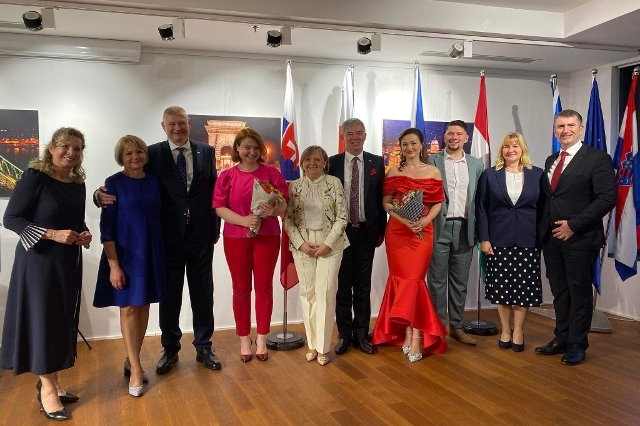Projev ministra Schwarzenberga v Ženevě
01.03.2011 / 12:49 | Aktualizováno: 02.03.2011 / 10:46
Projev prvního místopředsedy vlády a ministra zahraničních věcí ČR Karla Schwarzenberga na 16. zasedání Rady OSN pro lidská práva z 1.3.2011 (v angličtině).
Mr President, High Commissioner, ladies and gentlemen:
It is a great honour for me to be here today. It is a tradition for my country and my fellow citizens to stand for the ideals of peace, human rights and democratic principles. It is for this very reason that I personally feel obliged and, indeed, honoured, to enshrine them into our foreign policy. It is much easier for me as a former chairman of the Helsinki Federation of Human Rights, to walk this path of democratic governance which had been cemented and cultivated by so many Czech leaders, starting with the co-founder of first democratic and independent Czechoslovakia and its first president Tomáš Garrique Masaryk and ending, so far, with no other than Mr. Václav Havel, first President of the country that re-gained its freedom again.
Our own freedoms, humanity and civil society culture used to be oppressed for decades. That is why we do understand so much those who are challenged today by similar oppressions, that is why we assist the human rights defenders at all possible levels, in all directions and in the whole world.
What we all witness today in Northern Africa and around is the very same hunger of people for openness, freedom of speech and expression, rule of law and democracy. Tunisia and Egypt are the best examples and many seem to follow. These movements are a sign that freedom is within reach for everyone who believes in and struggles for universal democratic values, who still believes in the United Nations ideals. We therefore welcome the consensual outcome of the Special Session on the Situation of human rights in the Libyan Arab Jamahiriya and urge all countries to allow for substantial discussion on the Council's request during the today's session of the General Assembly in New York. Nevertheless, we would be even more impressed indeed if the unanimous and really clear words would be used before tyrants are tumbling and dictatorships are falling apart, since, as a rule, they come a little bit too late.
Also for these reasons, we closely follow the performance of the Human Rights Council, the only specialized body for the promotion and protection of human rights within the United Nations. The creation of the Council brought about a number of undisputed positive elements. Among them, I wish to specifically appreciate the Universal Periodic Review, which allows all States, regardless of their size, political system or economic development, to listen to the recommendations of their partners in dialogue on how to advance in human rights matters.
Another valuable element of the Council is its Special Procedures. In our view, the Special Rapporteurs are not expected to compliment governments on their achievements but rather to suggest where states can do even better. States may not necessarily agree on all the issues raised but should always extend them bona fide co-operation and give a serious thought to their recommendations. On the contrary: we need an independent expert voice to enrich our intergovernmental debate.
I am proud to announce that the Czech Republic aspires to become, and to work as, a member of the Human Rights Council and decided to present its candidature for the Council's membership for the period of 2011-2014 in the upcoming elections to be held in May in New York.
Mr. President:
While appreciating the positive contribution of the Council to the promotion and protection of human rights, I still see room for enhancing its performance. It concerns notably the capability of the Council to deal with serious or urgent human rights situations. It is true that the Council was in the past able to hold special sessions on Burma/Myanmar and on Sudan/Darfur, or recently to react quickly to the developing crisis in Côte d'Ivoire or in Libya. However, the Council has also on numerous occasions missed the opportunity to hold a victim-oriented debate on other situations of continued serious concern or developing crises, such as to the one in Iran or the post-election crackdown on opposition in Belarus. I therefore urge the Council to address this shortcoming and to increase the capacity of this body to react promptly whenever needed.
The full potential of citizens can be used only if everybody enjoys fundamental rights such as the right to education, freedom of thought, expression and association. It means that all individuals as well as legal entities should be able to rely upon a judicial system that is impartial, independent and professional, that everyone should be judged on their merits and not on their gender, race, ethnicity, political conviction or other similar factors.
We therefore cannot but see the release of the Nobel Prize laureate Ms. Aung San Suu Kyi from the house arrest in November last year as only the first step on the way to democracy in Burma/Myanmar, where an inclusive dialogue with political opposition and civil society must be launched in order to re-establish her as the only legitimate leader of the country. We therefore cannot but condemn the persecution of pro-democratic activists, lawyers, students and members of the civil society in Belarus and, lately, the revoking of licenses of four lawyers involved in the so-called "mass riot" case.
Mr President:
Let's take democracy as an ideal we have to strive for. Let us work together so that the Council champions new resolutions calling for accountability and enhanced commitment to human rights protection and promotion in the wake of human rights crises and presses for stronger engagement of all human rights mechanisms in places where rights of women, children, or minority communities are not fully respected.
Mr President, High Commissioner, ladies and gentlemen:
I thank you for your attention.






